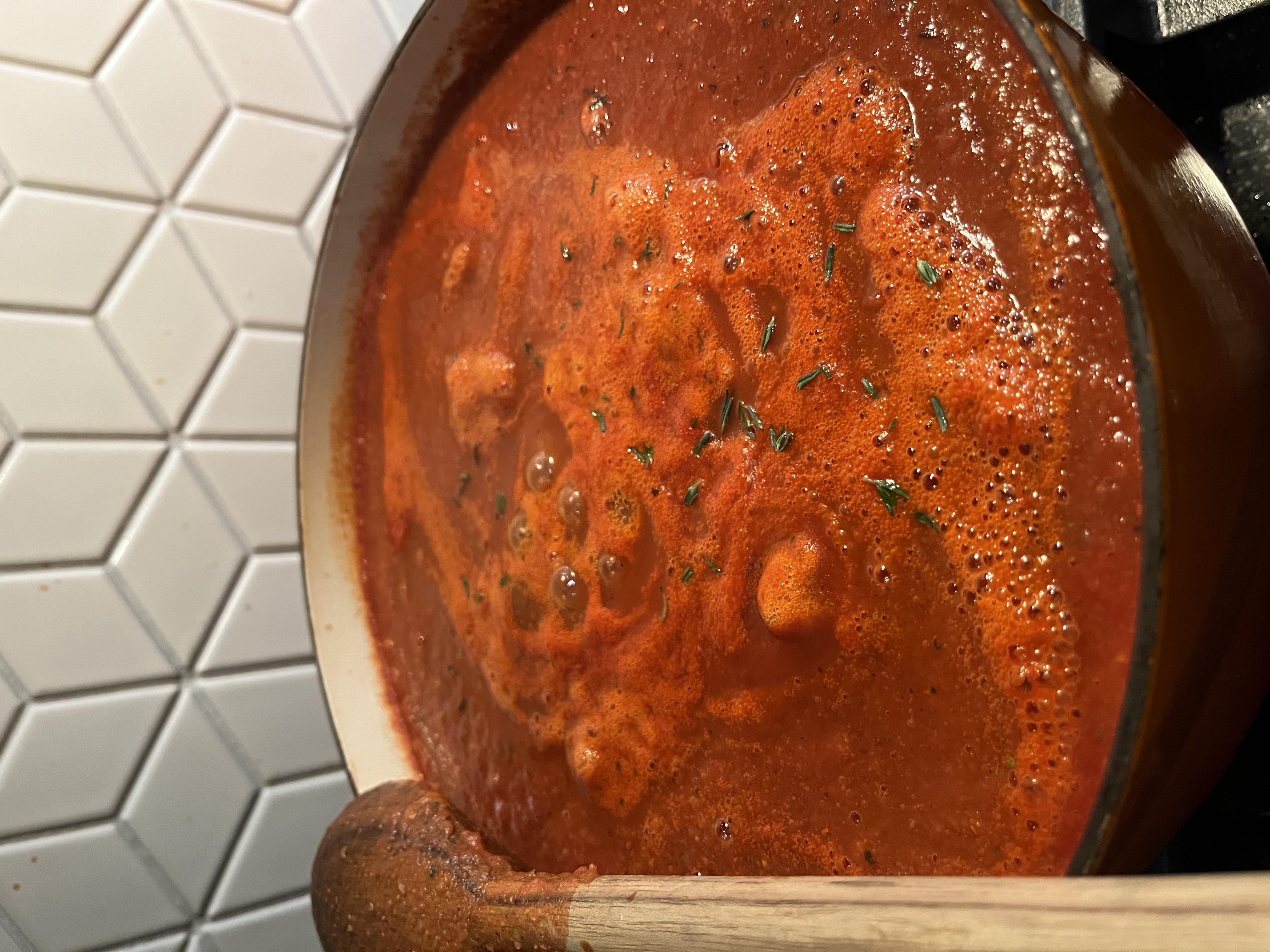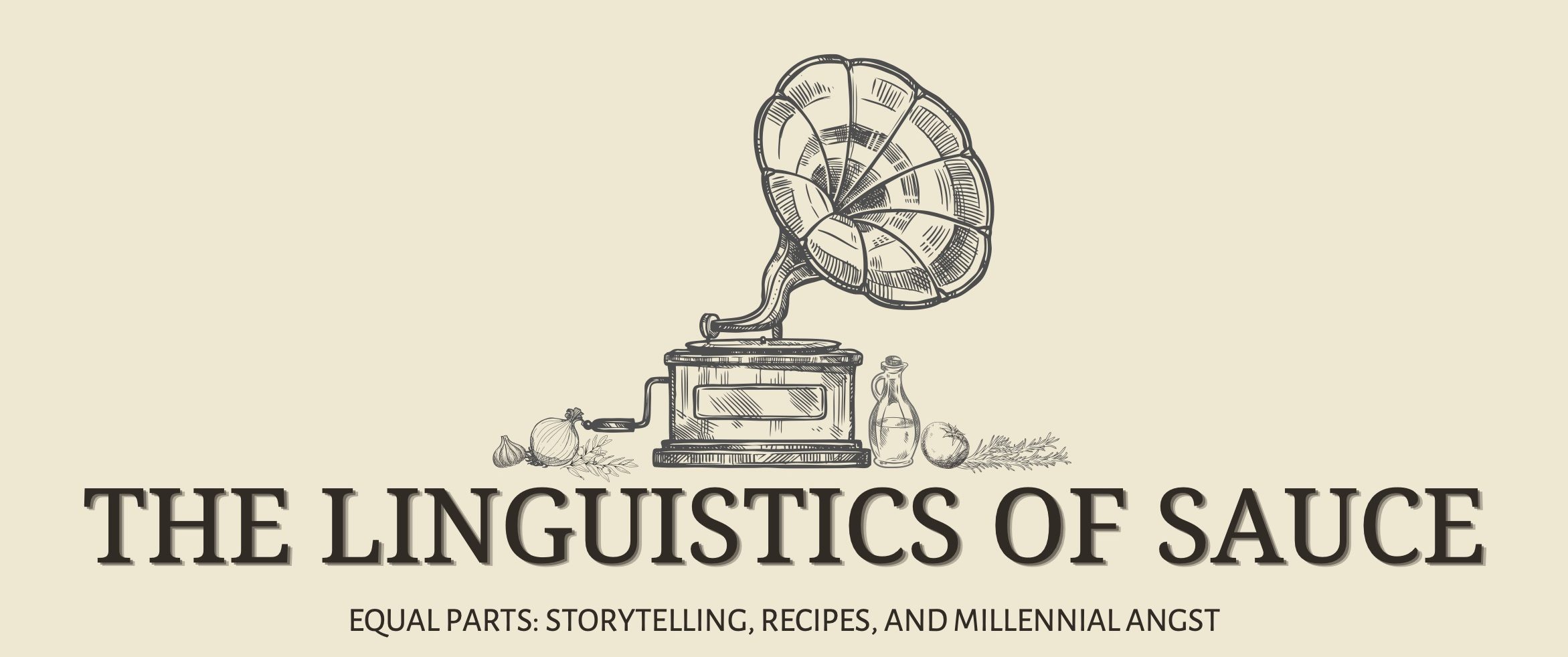The Linguistics of “Sauce” – An Introduction
Are you cooking because you have to eat,
or are you serving your heart on a plate?
A nonna is more than just a grandmother, she embodies the warmth and zest of a Tuscan kitchen balanced with a stern love born out of decades of patience and perspective.
At least, that’s what I think a nonna is—I never met mine in person, but I have come to know her through my father. Papa Fuchs has shown me what his mother and grandmother taught him as a young boy growing up in Brooklyn. The youngest of three, he would hide underneath the kitchen table from his older siblings as his grandmother snuck him pieces of dough.
Eventually he would become curious enough to crawl out from his bunker and observe the matriarchal kitchen etiquette that would eventually become bequeathed to him. Together, they rolled out pasta dough, stirred soups, chopped vegetables, and I’m sure once he was old enough (though not by legal standards) his grandmother would sneak him sips of red wine too, before pouring a generous dose into the Chicken Marsala.
When I was a child, and even still today, my favorite thing to do was sit in the kitchen and watch my father cook. He runs around in an organized chaos, brows furrowed and calloused hands moving in a blur across the cutting board, draining pasta in a strainer over the ceramic sink, or scraping an uneven layer of flour off a measuring cup with the back of a butter knife.
I sit and talk to him;
I ask questions, sometimes about food, sometimes about work, often rambling about my own life issues.
I know he’s not always fully listening, and I’m not sure he ever has been, but to be honest I’m more focused on the details of his movements than my own voice anyway.
Occasionally he’ll pause and look in my direction, his arms outstretched and flour-covered palms facing the ceiling, as he looks through me, squinting.
For a moment I wonder if he’s actually formulating an answer to something I just said about the state of American politics or my current law firm job or my impressively consistent singledom, but that thought quickly passes after he points an index finger in my direction and starts waving it around, using the air as scratch paper while he calculates the measurements of his recipe.
Like I said, he’s not really listening.
But it doesn’t really matter because I’m still impressed. Frankly, I’ve been in awe since I was four-years-old, sleepy but cozily clad in lavender footy pajamas, when he handed me my first egg sandwich, carefully packaged in too many layers of wrinkled plastic saran-wrap. We would then plop ourselves in the car at 4:00am, preparing for the bi-annual seven-hour roadtrip to Winnemucca to see my sister and brother, children from his first marriage.
To this day, those are the best egg sandwiches I’ve ever had. I’ll admit perhaps that rating is based moreso on nostalgia than merit . . . but, does that make it count any less?
In the last few years, I’ve hit my own groove in cooking. I have my own recipes, I try new ones, and occasionally I’ll wing a weeknight dinner with whatever’s in my fridge to a pretty satisfying result (if I do say so myself). After years of defending my academic priorities to family-wide disparagement of my limited cooking skills, it feels pretty good to turn to the tables and make tasty things.
But more importantly, I’ve finally cooked for my father in a way that made him proud and made him pay attention—possibly for the first time, hopefully not the last. And which magical recipe, you might wonder, was the catalyst that broke through those nuanced layers of communication? What got my mile-a-minute father to slow down and take notice? Sauce.[1]sauce (noun): a thick liquid served with food, usually savory dishes, to add moistness and flavor. Etymology: Middle English – from Old French, based on Latin salsus “salted,” … Continue reading

Indeed, there are two types of people in the world – those who buy sauce and those who make sawce.
The former attempt merely to dabble in the art of cooking, dipping their toe in the salted pasta water, perhaps even diving into a chicken stock. They have good intentions but, and I won’t make any friends here, they’re lazy.
But that’s okay, I’m here to help.
Sawce people are their own breed made up of patience, stamina, and ancestral tutorials. Sawce isn’t just a recipe, it’s a test. Have you fully understood the texture, acidity, and flavor profiles of your ingredients to bring them together in holy matrimony? Are you using the right tools to treat your ingredients with the care and concern they so desperately deserve?
But, most importantly, do you have what it takes—the requisite amount of time, energy, and palate—to make Nonna, or in my case, Papa Fuchs, proud? Are you cooking because you have to eat or are you serving your heart on a plate?
This, at least, is what sawce represents to me.
But sawce represents more than just my father’s accent and the flavor it has added to our cooking lessons over the years. It’s also a reflection of where he comes from: his childhood, his memories in that Brooklyn kitchen with his mother and grandmother, the dough and veggies and wine, the marriage of cultures and palates, of stories and appetites.
Sawce is the relationship I have to memories that were never mine. It serves as a gateway between my contemporary culinary journey and the origins of my family’s recipes, a link to an ancestral cookbook passed down through language, experience, and memory.
In any case, hereinafter I will spell it correctly for you, but just know that, for me, it will always and forever be sawce.
![]() Allora sei pronto? Click here to try your hand at Sawce.
Allora sei pronto? Click here to try your hand at Sawce.
References
| ↑1 | sauce (noun): a thick liquid served with food, usually savory dishes, to add moistness and flavor. Etymology: Middle English – from Old French, based on Latin salsus “salted,” past participle of salere “to salt.”
See also, sauce (verb): to speak impertinently; and sauced (adj) drunk. Usage: “Make sauce, get sauced, not necessarily in that order.” |
|---|

